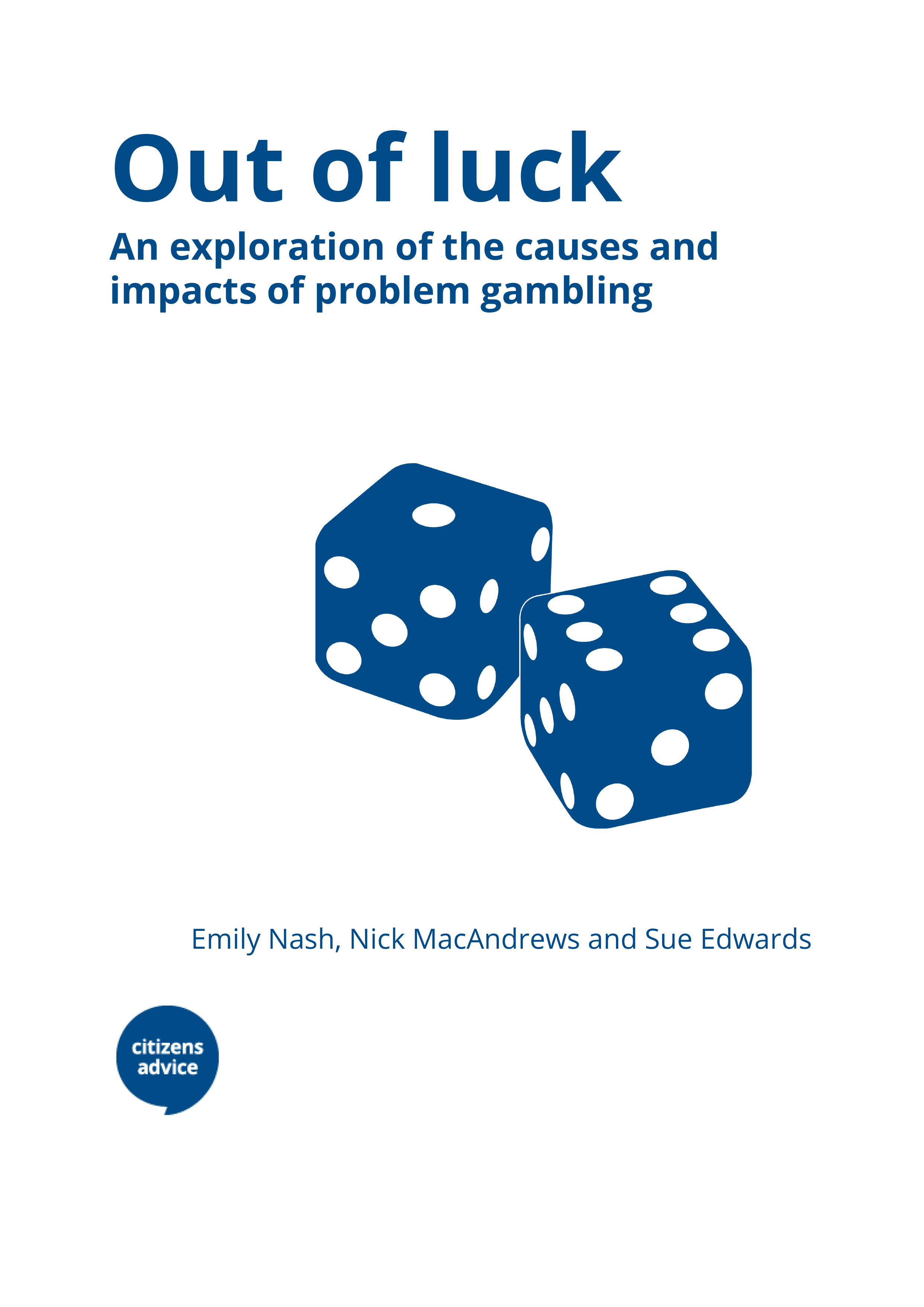Out of Luck - An exploration of the causes and impacts of problem gambling
The latest figures published by the Gambling Commission estimate that there are around 430,000 problem gamblers in Great Britain (GB) with almost 2 million more people being considered ‘at risk’ based on their gambling behaviour (Gambling Commission, Gambling behaviour in Great Britain in 2015: Evidence from England, Scotland and Wales, August 2017).
The impact of gambling-related harm is varied and wide-reaching. Financial losses, debt, housing problems, relationship breakdown, and decreased mental wellbeing are consistently reported by both gamblers and their families, friends, and co-workers. While action has been taken, and support services provided to help those affected, our research shows that this has not tackled the problem.

As a generalist and holistic advice service, the Citizens Advice service is well-placed to spot the signs and impact of problem gambling. Building on our existing insight we surveyed more than 1,500 people affected by their own gambling, or someone else’s, and interviewed 35 people about their experiences of gambling-related harm. We found that:
1. Gambling-related harm affects far more people than just the problem gambler. Some estimates suggest that for every problem gambler, between 6 and 10 additional people (such as friends, family or co-workers) are directly affected. This means that between 2.5 to 4.3 million people in Great Britain may be affected by gambling-related harm. Around one in ten of our survey respondents told us that more than 10 additional people were impacted.
2. Gambling can lead to financial difficulties: More than three-quarters of gamblers and more than two in five affected others had built up debt as a result of gambling. Over a third of families with children couldn’t afford essential costs such as food, rent and household bills as a result of a family member’s gambling.
3. Gambling has an impact on people's mental health: Two-thirds of gamblers we interviewed reported mental distress as an impact of their gambling. More than nine in ten affected others experienced emotional distress.
4. Problem gambling affects family relationships and can cause relationship breakdown: Three in five people told us that they had experienced relationship problems as a result of gambling. More than a third of households with children experienced family breakdown.
5. A range of interlinked factors contribute to problem gambling: Ease of access to and lack of restrictions on gambling, isolation, escapism, boredom, thrill-seeking, behavioural traits, mental health problems and exposure at a young age were all mentioned as causes for problem gambling. The prevalence of advertising made it harder for those with a problem to stop.
6. Tools to manage gambling addiction don’t work for everyone: For tools to work, gamblers need to acknowledge they have a problem, which can be difficult. Existing tools need to be improved to make them more effective.
7. Gambling support services are not always suitable or easily accessible: There aren’t enough local services specifically for gambling addiction and levels of funding are insufficient to meet the need.
Recommendations
Recommendation 1: The government should ensure there is sufficient funding for research, education, and treatment for problem gamblers and affected others by using its existing powers to introduce a compulsory levy on all gambling firms
Recommendation 2: GambleAware should ensure its planned research explores:
Innovation of financial controls for problem gamblers
The development of more suitable, inclusive and accessible support for problem gamblers and affected others from different backgrounds
How support can be better delivered locally and tailored to local needs
GambleAware should also ensure that all awareness raising activities about problem gambling includes affected others.
Recommendation 3:The gambling industry should be be more proactive in using their existing data and technology to identify and help problem gamblers.
Recommendation 4:Banks and creditors should provide training to their staff so that they feel more comfortable talking to customers about gambling addiction.
Banks and credit card companies should investigate how they can use their data to identify the signs of problem gambling and signpost their customers to support. Where appropriate, creditors should allow their customers more flexibility to restrict gambling transactions and reduce lines of credit.